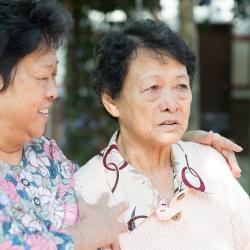

One of the drafters, Xiao Jinming, a law professor at Shandong University, said the new law was primarily aimed at raising awareness. “It is mainly to stress the right of elderly people to ask for emotional support. … We want to emphasize there is such a need,” he said.
The law says adults should care about their parents “spiritual needs” and “never neglect or snub elderly people”.
Evidently, elderly parents in China already have been suing their adult children for emotional support.
China’s legislature amended this existing law in December following frequent reports of elderly parents neglected by their children. It says offspring of parents older than 60 should see that their daily, financial and spiritual needs are met.
Although respect for the elderly is deeply engrained in Chinese society, three decades of market reforms have accelerated the breakup of China’s traditional extended family, and there are few affordable alternatives, such as retirement homes.
The number of people aged 60 and above in China is expected to jump from the current 185 million to 487 million, or 35 percent of the population, by 2053, according to figures from the China National Committee On Aging.
And we thought the U.S. had an aging crisis.
Nonetheless, the intent is a sound one whether you are in China or elsewhere. As I told a reporter recently,
“I started my mission for elders when I went into a nursing home and sang for them. That was some 20 years and 2,000 performances ago. I have a close relationship with the elders I entertain. And that gets to the heart of your first question, whether it’s possible to legislate filial feeling. There are so many assisted living and nursing home residents who are put in these places and left. It is alarming how few have visitors so it leaves it up to volunteers, people like myself and dedicated family caregivers to pick up the slack. How we live our life when we are young will impact how we age and that applies to relationships. It plays out naturally. Close-knit families are the ones you see caring for their elders. So unless there are family reconciliations, you cannot force feelings. And while I am not a gerontologist or sociologist, I probably have spent many more hours around elders than most.”
And that is what I see – a lot of lonely elders. Let’s not neglect them.
(Visit your parents / shutterstock)